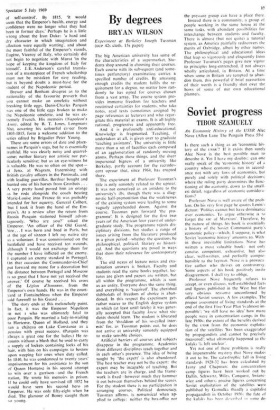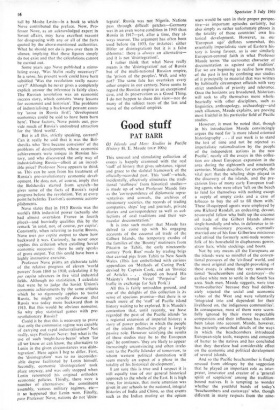Soviet progress
TIBOR SZAMUELY
An Economic History of the USSR Alec Nove (Allen Lane The Penguin Press 55s) Is there such a thing as an 'economic his- tory of the USSR"? If it exists then surely Alec Nove is the best possible man to describe it. Yet I have my doubts: can one really speak of the 'economic history' of a country whose economy is run in accord- ance not with any laws of economics, but purely and solely with political decisions; where the ruling party determines the func- tioning of the economy, down to the small. est detail, regardless of economic considera- tions?
Professor Nove is well aware of the prob- lem. On his very first page he quotes Lenin's dictum: 'Politics cannot but have dominance over economics. To argue otherwise is to forget the ABC of Marxism'. Therefore, by the nature of things, his book is essentially a history of the Soviet Communist party's economic policy—which, I suppose, is wh.it Soviet 'economic history' amounts to. With- in these inevitable limitations Nove has written a most valuable book : not only concise. competent. exhaustive, but also clear, well-written, and perfectly compre- hensible to the layman. Novc is a provoca- tive author who thrives on controversy. Some aspects of his book positively invite disagreement. I shall try to oblige.
Professor Nove frequently refuses to accept, or even discuss, well-established facts and figures published in the West but (for very obvious reasons) unconfirmed by official Soviet sources. A few examples. The proper assessment of living standards at the end of the first Five-Year Plan 'is almost im- possible': 'we still have no idea' how many people were in concentration camps in the late 1930s; the extent of the benefits derived by the USSR from the economic exploita- tion of the satellites 'has been exaggerated by propagandists and cannot be precisely measured'; what ultimately happened to the kulaks 'is left unclear'.
Yet not one of these problems is really the impenetrable mystery that Nove makes it out to be. The catastrophic fall in living standards 1928-32 has been calculated by Jasny and Chapman: the concentration camp figures have been worked out by Dallin, Schwartz, Wiles. Conquest, Swiane- wicz and others; precise figures concerning Soviet exploitation of the satellites were published by Gomulka (hardly a capitalist propagandist) in October 1956: the fate of the kulaks has been deccribed in some de-
tail by Moshe Levin—in a book to which Nove contributed the preface. Now, Pro- fessor Nove, as an acknowledged expert in Soviet affairs, may have excellent reasons for disagreeing with any or all of the facts quoted by the above-mentioned authorities. What he should not do is pass over them in silence, implying that these figures simply do not exist and that the calculations cannot be carried out.
Some years ago Nove published a stimu- lating essay, 'Was Stalin really necessary?' In a sense, his present work could have been subtitled 'Was the revolution really neces- sary?' Although he never gives a completely explicit answer the inference is fairly clear. The Russian revolution was an economic success story, which contains 'many lessons for economist and historian'. The problems of industrialising a backward peasant coun- try 'arose in Russia first'; 'development economics could be said to have been born here'. These factors, Nove points out, pro- vide much of Russia's undoubted attraction for the 'third world'.
But is all this, strictly speaking, correct? Can it really be said that it was the Bol- sheviks who 'first became conscious' of the problems of development, whose economic achievements were unique in Russian his- tory, and who discovered the only way of industrialising Russia—albeit at an incred- ible price? Professor Nove appears to think so. This can be seen from his treatment of Russia's pre-revolutionary economic devel- opment. He does not, of course, imply that the Bolsheviks started from scratch—he gives some of the facts of Russia's rapid progress before the revolution. Yet at every point he belittles Tsarism's economic accom- plishments.
Nove states that in 1913 Russia was the world's fifth industrial power (actually she had almost overtaken France in fourth place)—and hurriedly qualifies this by the remark 'in total, not, of course, per capita'. Constantly, when referring to tsarist Russia, Nove uses per capita output to show how backward it was. Curiously, he never once applies this criterion when extolling Soviet economic successes: there he only speaks of gross output. Yet this could have been a highly instructive exercise.
Professor Nove prints an elaborate table of the relative progress of eleven 'world powers' from 1860 to 1910, calculating it by per capita advances in five vital industrial fields. Although no statistician, I calculate that were he to judge the Soviet Union's economic achievements by the same criteria which he so rigorously applies to tsarist Russia, he might actually discover that Russia was today more backward than in 1913. But this would be obvious nonsense. So why play statistical games with pre- revolutionary Russia?
Could it be that this is necessary to prove that only the communist regime was capable of carrying out rapid industralisation? Not really, says Professor Nove: but what is the use of such `might-have-beens' when 'for all we know or can know, the alternative to Lenin in the given circumstances was disin- tegration'. Here again I beg to differ. First, the 'disintegration' was to no inconsider- able degree facilitated by Lenin himself. Secondly, economic 'disintegration' took place anyway, and was only stopped when Lenin renounced his original orthodox economic policies. Thirdly, there were a number of alternatives: the constituent assembly, various military regimes, etc— it so happened that Lenin won. Finally, pace Professor Nove, nations do not `disin- tegrate'. Russia was not Nigeria. Nations pass through difficult patches—Germany was in an even worse condition in 1945 than Russia in 1917—yet, after a time, they al- ways recover. The argument has often been used before (in 1933, for instance: either Hitler or disintegration) but it is a false dilemma: there is always an alternative— and it is not 'disintegration'.
I rather think that what Nove really means is the 'disintegration' not of Russia but of the multi-national Russian empire, the 'prison of the peoples'. Well, and why not? The same fate has overtaken every other empire in our century. Nove seems to regard the Russian empire as an exceptional case, and its preservation as a Good Thing. I do not happen to share this view—nor do many of the subject races of the last and worst of the colonial empires.



































 Previous page
Previous page